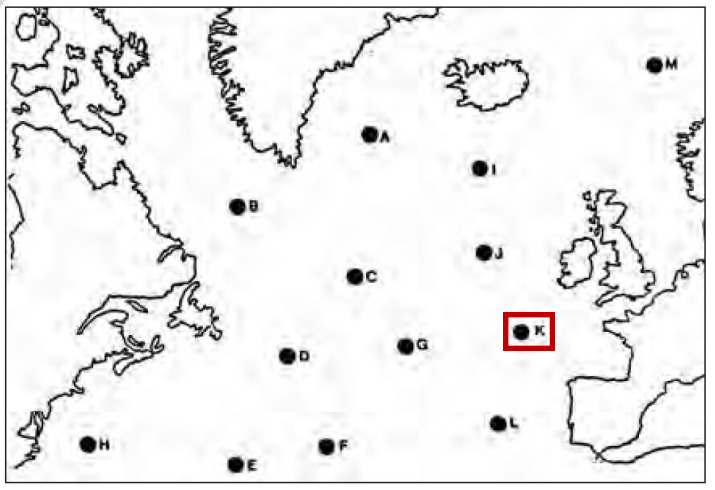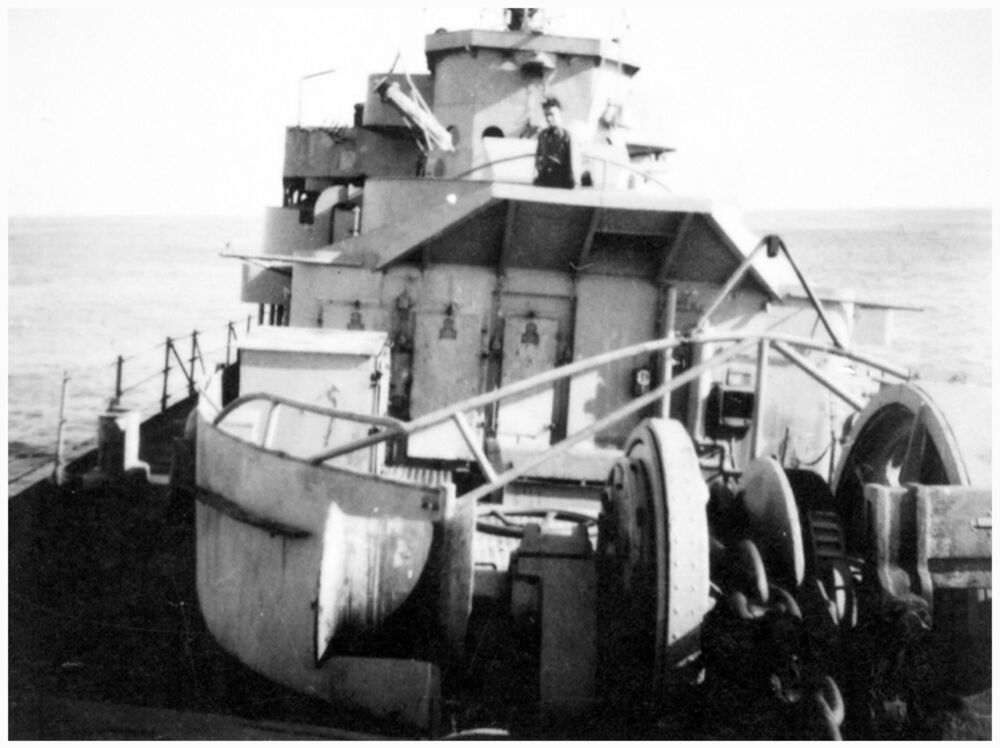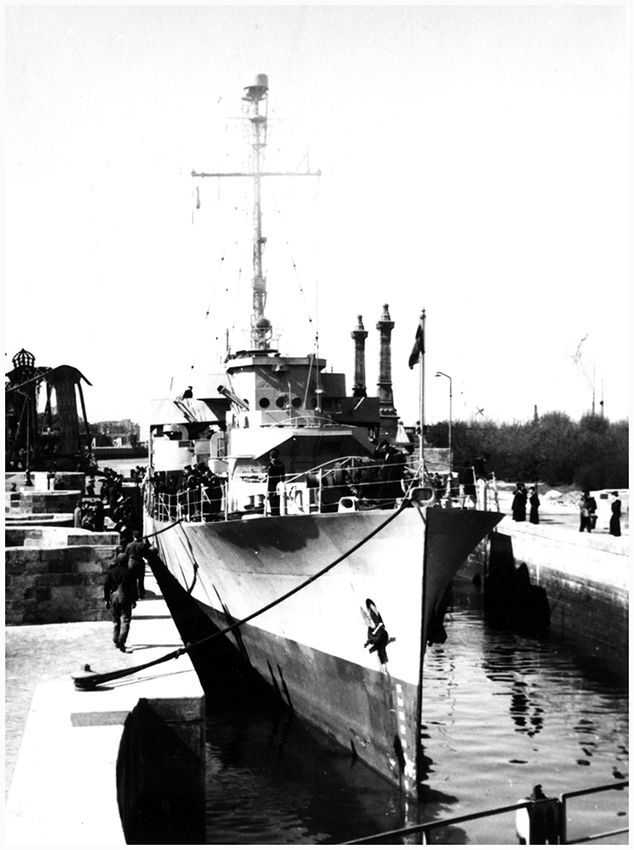- Yes
- No
- (independent) BeNeLux tree
- France: BeNeLux subtree
- other
- no/negative
TL;DR: A Belgian Frigate, armed with 76 mm, 120mm AA and 40mm bofors.

History
History
History and Service
Construction
Victor Billet was originally laid down at the Globe Shipbuilding Company in Superior, Wisconsin, United States. The shipyard launched her on 31 July 1943 under the name USS Sheboygan (PF-57) as part of the Tacoma-class patrol frigate program. She was commissioned on 26 May 1944 and assigned to the United States Navy.
In US service as USS Sheboygan (PF-57)Transfer
Following service as a weather ship in the Pacific Ocean during World War II, she was decommissioned on 9 August 1946 and sold to the Belgian Navy on 2 April 1947 for the nominal price of 25,000 US dollars. She was recommissioned as F910 Lieutenant ter Zee Victor Billet, joining the Belgian Naval Forces.
Name Explanation
The ship was named in honor of Lieutenant ter Zee Victor Billet, the first Belgian naval officer of the Royal Navy Belgian Section during World War II. Naming the ship after him recognized his dedication and service.
Attribution to Science
After her acquisition by the Belgian Navy in early 1947, F910 Lieutenant ter Zee Victor Billet was swiftly deployed as a meteorological vessel. She became part of an international chain of 13 weather ships stationed throughout the Atlantic Ocean to gather meteorological data essential for the rapidly growing aviation industry. This decision was formalized at a 1946 conference in Dublin under the Provisional International Civil Aviation Organization (PICAO, now ICAO) and the International Meteorological Organization (IMO, precursor to the World Meteorological Organization).
Launching of a Radiosonde balloon in 1948 on the Victor Billet.A subsequent conference in 1947 defined the implementation of the weather ship system starting on 1 July 1947. Belgium was assigned to share the 13th and final position, designated ‘K’, with the Dutch Navy’s HNLMS Sirius, under the precursor of the BeNeSam agreement. This position lay at approximately 47°N, 15°W, about 700 nautical miles west of Bordeaux and 500 nautical miles southwest of Ireland. The two vessels alternated 27-day deployments at sea (21 days on station, 6 days transit) followed by 15 days in port for resupply and repairs.
This map shows the locations for weather stations between the years 1947 and 1949. Weather station K is in the red box.The Victor Billet fulfilled this meteorological duty until May 1949, when budget constraints led to a reduction in weather ship stations from 13 to 10. She was then rearmed as a frigate and served from October 1950 until January 1958 as a school and fishery patrol ship.
Her scientific contributions didn’t end in 1949, however. In the early 1950s, the ship supported the Zeewetenschappelijk Instituut (ZWI) with sampling campaigns tied to both national studies and the international ICES (International Council for the Exploration of the Sea) project. Founded in 1902 and based in Copenhagen, ICES coordinated oceanographic research and advice for sustainable marine resource use. Belgium, an ICES member since 1903, had already contributed ships such as West-Hinder, Ville d’Anvers, A961 Zinnia, and Hinder.
Victor Billet in 1951.Between 1951 and 1952, the Victor Billet contributed hydrological data collection in the North Sea as part of the ICES project. From May to October 1952, the ZWI also deployed her on five scientific cruises to fishing grounds frequently visited by Belgian fishermen. These studies, led by researcher Charles Gilles of ZWI and in cooperation with other research bodies, further expanded Belgium’s marine scientific legacy.
Legacy
Victor Billet’s contributions to maritime meteorology, aviation safety, and marine science research played a crucial role in the development of Belgian and international cooperation at sea. Her name stands as a tribute to Belgian naval service and the dedication of her namesake.
Decommissioning and Fate
For reasons not fully documented, her career ended rather early, with decommissioning on 1 January 1958. On 26 October 1959, she was sold for scrapping to Gebroeders Van Heyghen in Ghent, marking the end of her service.
Specifications
Details Tonnage 1,548 tons (gross) / 1,185 tons (net) Dimensions 93m (length) x 11.40m (beam) x 4.20m (draft) Displacement 1,430 tons standard; 2,100 tons full load Propulsion 2 x Koppers triple-expansion steam engines; 3 boilers; 2 shafts; 5,500 HP total Speed 20 knots (max), 14 knots (economical) Range 7,800 nautical miles at 12 knots Crew 7 officers, 37 petty officers, 98 enlisted ratings (approx. 142 total) Weaponry Main Gun 1 x 3"/50 caliber (76mm) dual-purpose gun Secondary AA 2 x twin 40mm Bofors Mk 3; 2 x single 40mm Bofors Additional AA 2 x 120mm AA guns (believed to be adapted army mounts) ASW Weapons 8 x anti-submarine mortars; 2 x depth charge rails Radar Surface search radar (standard for Tacoma-class) Sonar Hull-mounted sonar for anti-submarine detection Meteorological Equipment Radiosonde balloon launch equipment; radar tracking for balloon ascents Radio Navigation Equipped to provide transatlantic aircraft radio beacon support; radio direction finding
Place in War Thunder
The F910 Lieutenant-ter-Zee Victor Billet would be a decent rank IV or V in any Belgian/Benelux Coastal (sub)tree, sporting some armour and decent weaponry suitable for around the 3.x BR. Representing some of the largest frigates in-use in the Belgian Navy Component from the middle of the 20th century.
Pictures
Sources
Sources
VLIZ Wetenschatten (2015). F910 Luitenant ter zee Victor Billet - Historische mijlpalen van het zeewetenschappelijk onderzoek. VLIZ Information Sheets, 151. Vlaams Instituut voor de Zee (VLIZ): Oostende, 3 pp. (version 25/08/2015)
Marine Belge, Mangelinckx, D., Loiselet, M.-L., & Swertvaegher, Y. (n.d.). Victor Billet. Retrieved June 11, 2025, from VictorBillet
Brugge (Bruges) - Monument ternagedachtenis van Luitenant ter Zee Victor BILLET - Monument de la mémoire du Lieutenant de Vaisseau Victor BILLET. (n.d.). Brugge (Bruges) - Monument ternagedachtenis van Luitenant ter Zee Victor BILLET - Monument à la mémoire du Lieutenant de Vaisseau Victor BILLET
Friends of the Navy Section of the Royal Museum of the Army and Military History. (n.d.). Frigate LTZ Victor Billet. Retrieved June 11, 2025, from http://www.marine-mra-klm.be/fregat_ltz_victor_billet_646.htm
Friends of the Navy Section of the Royal Museum of the Army and Military History. (n.d.). From the Navy to the Marine (1946–2005). Retrieved June 11, 2025, from http://www.marine-mra-klm.be/vloot_zm_marine_185.htm
NavSource Naval History. (n.d.). USCGC Sheboygan (PF 57). Retrieved June 11, 2025, from http://www.navsource.org/archives/12/08057.htm
Van Ginderen, L., & Delgoffe, C. (1996). Photobook Belgian Navy = Album photographique force navale = Photobook Belgian navy 1946–1996. Flemish Maritime Exchange Association.
Coulier, R. F. (2007). Fishery patrol vessels: Part 2. Neptunus, 50(287), 72–77.
Rubbens, H. (2014). Commemoration for Lieutenant at Sea Victor Billet. Belgian Defense. Retrieved June 11, 2025, from http://www.mil.be/nl/artikel/herdenking-voor-luitenant-ter-zee-victor-billet
Jansen, W., Kuiper, J., Maas, A., Reitsma, A., & de Vries, P. (Eds.). (2011). No sea too high: The weather ships and the KNMI. KNMI.
Van Meel, L. (1972). The southern North Sea, the Pas-de-Calais and the English Channel: An essay on marine ecology, especially regarding microplankton: I. Study of the environment. Royal Belgian Institute of Natural Sciences.
Van Meel, L. (1952a). Scientific trial cruises in the Belgian sea fishery. The Fisheries Journal, May 9, p. 7.
Van Meel, L. (1952b). The fishery patrol vessel Victor Billet returns. The Fisheries Journal, June 27, p. 2.








